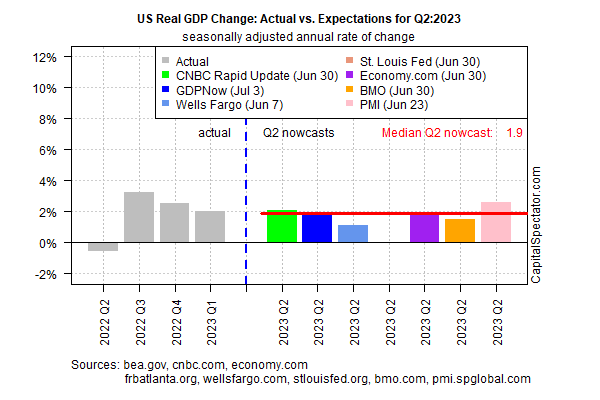Second-quarter economic activity has picked up for the US, based on the median estimate via several sources compiled by CapitalSpectator.com. The firmer nowcast offers fresh support for expecting that the US economy will extend a moderate expansion into Q2 in the official quarterly report that’s scheduled for release later this month.
Growth is on track to rise 1.9% (seasonally adjusted annual rate for GDP) for the April-through-June period, according to the median nowcast. The projection is fractionally below the 2.0% increase in Q1. The Bureau of Economic Analysis will publish its initial Q2 estimate for GDP on July 27.

Today’s revised Q2 nowcast for a 1.9% rise marks a substantial improvement over the previous 1.3% median estimate published on June 20.
Some analysts have revised economic expectations higher recently. Ed Yardeni, who heads the eponymous Yardeni.com, tells CNBC that the US economy has shifted from a “rolling recession” to a “rolling recovery.”
He adds that headwinds are building for the housing sector.
“There’s going to be a recession in commercial real estate over the next year or two. But I don’t think that sector is big enough to take the economy down.”
However, some economists continue to see trouble brewing, noting that manufacturing is contracting and the recent rise in interest rates, which is expected to continue, will soon tip the economy into recession.
The key counterpoint to recession forecasts is that consumers continue to spend while companies hire more workers. Personal consumption expenditures rose for a fifth straight month in June, albeit sluggishly. The year-over-year trend for spending, however, remains relatively steady at 6%-plus.
US payrolls rose a strong 339,000 in May, a four-month high. Friday’s labor market update for June is expected to show a softer gain of 213,000, according to Econoday.com’s consensus forecast. Still, if accurate, that will be high enough to reaffirm that hiring remains strong enough to keep the economy expanding.
Various risks are lurking that could create trouble for the economy later in the year. But now, the odds are low that an NBER-defined recession has started or is imminent. Short of an epic collapse in upcoming numbers for June, the US expansion looks set to persist.
